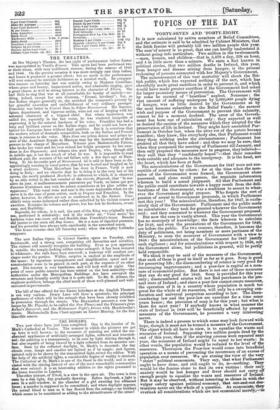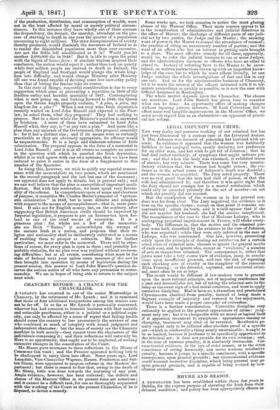TOPICS OF THE DAY
'FORTY-SEVEN AND 'FORTY-EIGHT.
IT is now calculated by active members of Relief Committees, and the estimate is said to be admitted by Cabinet Ministers, that the Irish famine will probably kill two million people this year. The sum'of misery is so great, that one can hardly understand it without going into particulars. Two million in the twelvemonth —men, women, and children—that is, 5,479 a day, 228 an hour, and 4 in little more than a minute. iV'e state a fact known in political circles, that two million deaths in Ireland, this year, from hunger and disease arising from hunger, is the present reckoning of persons connected with her Majesty's Government.
The announcement of this vast mortality will shock the Bri- tish public, which has expected nothing of the sort, which has cheerfully made great sacrifices in order to prevent it, and which would have made greater sacrifices if the Government had asked for larger pecuniary means of prevention. The Government will by some be accused of " heartless" neglect. Nonsense : the vast amount of suffering undergone by 2,000,000 people dying of hunger, was as little desired by the Government as by the most humane subscriber to the Relief Funds : the earnest wish and purpose of the Government to prevent this calamity, cannot be for a moment doubted. The error of the Govern- ment has been one of calculation only : they expected as well as desired the success of the measures which they adopted for the preservation of life in Ireland. They might have assembled Par- liament in October last, when the utter rot of the potato became
manifest ; they knew, like everybody else, that Parliament would deny them nothing under the circumstances ; Parliament has granted all that they have asked : and thus we may be sure, that when they postponed the meeting of Parliament till January, and then only proposed the measures now in progress, they. believed— they said that they " confidently hoped "—that their remedies were suitable and adequate to the emergency. It is the head, not the heart, which has been at fault. The miscalculations of the Government for 1847 were not sus-
ceptible of correction by others: for at the time when the mea- sures of the Government were formed, the Government alone possessed, and alone could possess, the requisite information whereon to build a sound judgment. All that Parliament and the public could contribute towarde a happy result from the deli- berations of the Government, was a readiness to assent to what- ever the Government might propose. Who forgets the sort of passion of assent to Government proposals, in which Parliament met this year ? The miscalculation, therefore, for 1847, is exclu- sively that of the Government. Parliament and the public made no calculations : they took for granted whatever the Government said ; and they consented to whatever the Government proposed. But now the case is vastly altered. This year the Government
has no monopoly of knowledge : the facts whereon to calculate for 1848, and even the precautions of the Government for 1848, are before the public. For two reasons, therefore, it becomes the duty of politicians, not being members or mere partisans of the Ministry, to scan the measures of Government with a view to 1848: the miscalculations of the Government for 1847 justify such vigilance ; and for miscalculations with respect to 1848, not the Government alone, but politicians in general, will be partly held responsible.
We think it may be said of the measures of the Government,
that each of them is good in itself as far as it goes. Soup is good for preserving. life ; the disencumbering of estates is very good for encouraging improvements • and a poor-law is capital as a mea- sure of economical police. But there is not one of these measures that can do any good for 1848. Soup is provided for this year only; disencumbered estates will not find purchasers in the pre- sent state of Ireland ; and since a poor-law cannot create resources, the operation of it in a country whose population is much too great for the whole of its resources, will only be a sweeping con- fiscation and universal pauperism according to law. The disen- cumbering law and the poor-law are excellent for a time some years hence ; the provision of soup is for this year ; but what is there for next year? If anybody knows in what manner the state of Ireland in 1848 will be beneficially affected by present measures of the Government, he possesses a very interesting secret.
There is indeed a process to which some may look forward with
hope, though it must not be termed a measure of the Government. The object which all have in view, is to equalize the wants and resources of Ireland. Supposing two million people dead by the end of this year, then if the starving process were repeated next year, the resources of Ireland might be equal to her wants: in other words, the population would be reduced to the level of the resources. Thereupon the Poor-law would come into beneficial operation as a means of preventing the recurrence of an excess of population over resources. We are stating the view of the very "strict" political economists. They say, that what Parliament ought to have done, and still ought to do, is—nothing. They would let the famine alone to find its own victims : their only anxiety would be lest hunger and fever should not carry off enough people to equalize the wants and resources of Ireland. But it may be observed, without intending to chime in with the vulgar outcry against political economy, that out-and-out doc- trinaires never see the whole of a question. As economists, they overlook all considerations which are not economical merely,—as if the production, distribution, and consumption of wealth, were not in the least affected by moral or merely political circum- stances. In this instance they leave wholly out of their account the despondency, the despair, the anarchy, attendant on the pro- cess of starving to death in one year the quarter of a population amounting to eight millions. The utter disorganization of society thereby produced, would diminish the resources of Ireland so as to render the diminished population more than ever excessive. Are not the fields left uncultivated as it is? Would you let another 2,000,000 die in 1848? But it is idle to argue the point with the bigots of laissezfaire: if absolute wisdom inspired their conclusion, the nation would reject it : rather than look on quietly while four million people are starved to death in Ireland, the people of England and Scotland would plunge the whole king- dom into difficulty, and would change Ministry after Ministry till one was found capable of devising some less unworthy policy than that of letting the famine take its course. In this state of things, respectful consideration is due to every suggestion which aims at preventing a repetition in 1848 of the fruitless outlay and horrible mortality of 1847. Contemplating what is now going on, and looking forward to 1848, the Queen upon the throne might properly exclaim, " A plan, a plan, my kingdom for a plan!" When a not very wise Irish deputation recently waited on Lord John Russell and objected to the Poor- law, he asked them, what they proposed ? They had nothing to propose. But in a short while the Minister's question is answered by Irishmen. A score of them have submitted to Lord John Russell what, they say, is "at any rate a plan." And more like a plan than any measure of the Government, this proposal assuredly is : for it has a distinct aim ; and if its means were as certainly practicable as they are obviously appropriate, its efficacy would be unquestionable. It is a large and elaborate scheme of Irish colonization. The proposal appears in the form of a memorial to Lord John Russell; and it is at all events so complete an answer to the question with which he puzzled the Irish deputation, whilst it so well agrees with our own opinions, that we have been induced to print it entire in the form of a Supplement to this number of the Spectator.
In doing this, however, we wish to notify our especial concur- rence with the memorialists on two points, which are mentioned in the second paragraph and the last but one of the document : our approval does not apply to details, but is general only ; and we can well believe that the plan is susceptible of important modi- fication. But with this reservation, we must speak very favour- ably of the scheme. In comprehensiveness of scope and clearness of purpose, it resembles Mr. Charles Buller's proposal of " system- atic colonization " in 1843, but is more definite and complete with respeetto the means of accomplishment—that is, more prac- tical. It asks not for English money, but, on the contrary, after suggesting that British American credit should be improved by Imperial legislation, it proposes to put an Income-tax upon Ire-
land as one of the chief means of execution. It is a generous plan : for, whilst not a few of the memorial- ists are Irish " Tories," it acknowledges the wrongs of the ancient Irish as a nation, and proposes that their re- ligion and nationality shall be deliberately cultivated as a means of enabling them to prosper as colonists. But for further particulars, we must refer to the memorial. There will be objec- tions of course, for every plan is open to them ; and probably for- midable obstacles, for no plan ever was realized without overcom- ing difficulties : but at all events, considering what must be the state of Ireland next year unless some measure of this sort be then brought into operation by means of legislation daring the present session, this answer 'to Lord John Russell's; question de- serves the serious notice of all who have any pretension to states- manship. 'We are in hopes of being able to return to the subject next week.



































 Previous page
Previous page